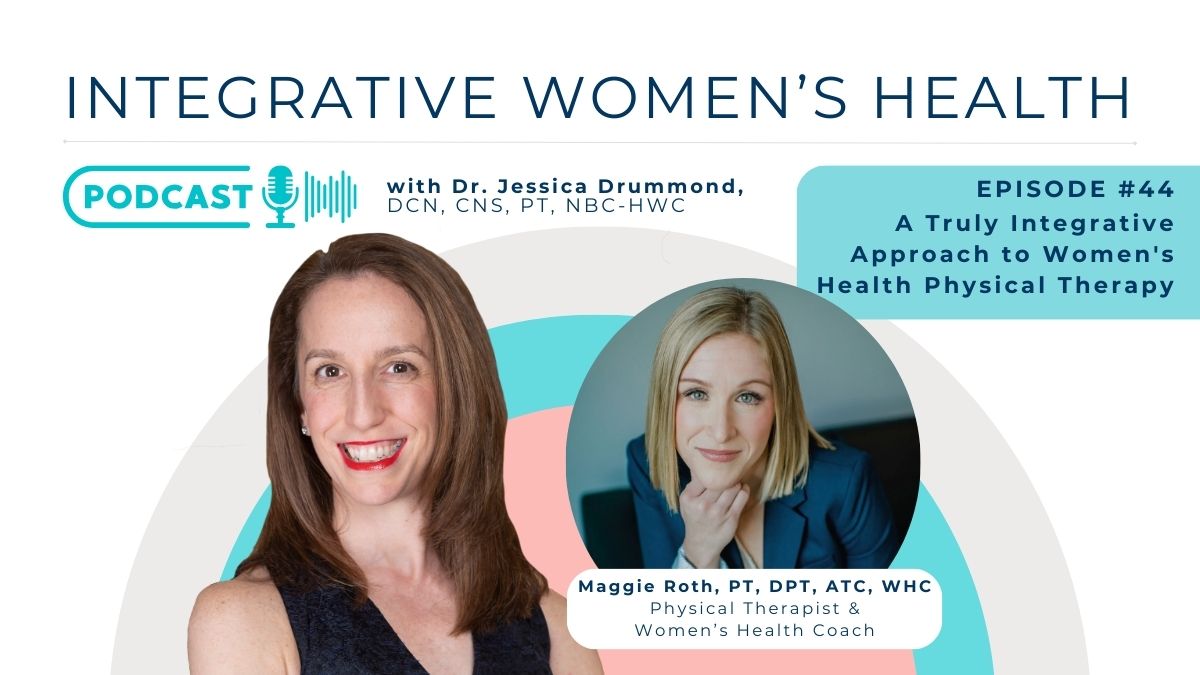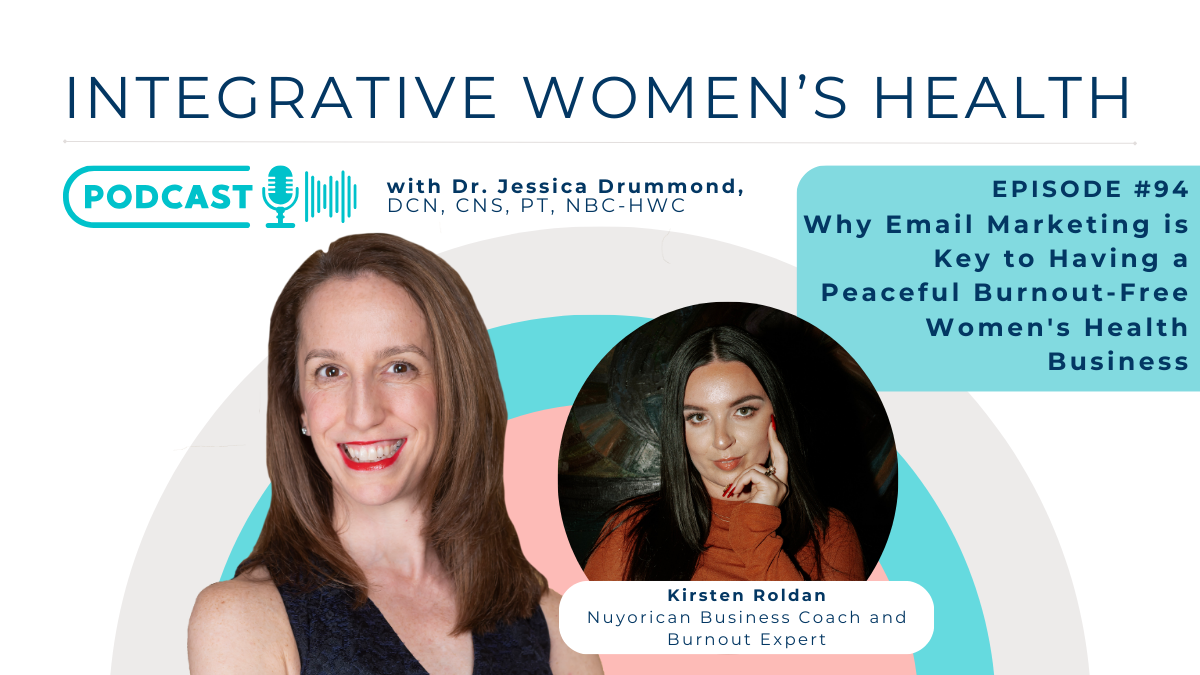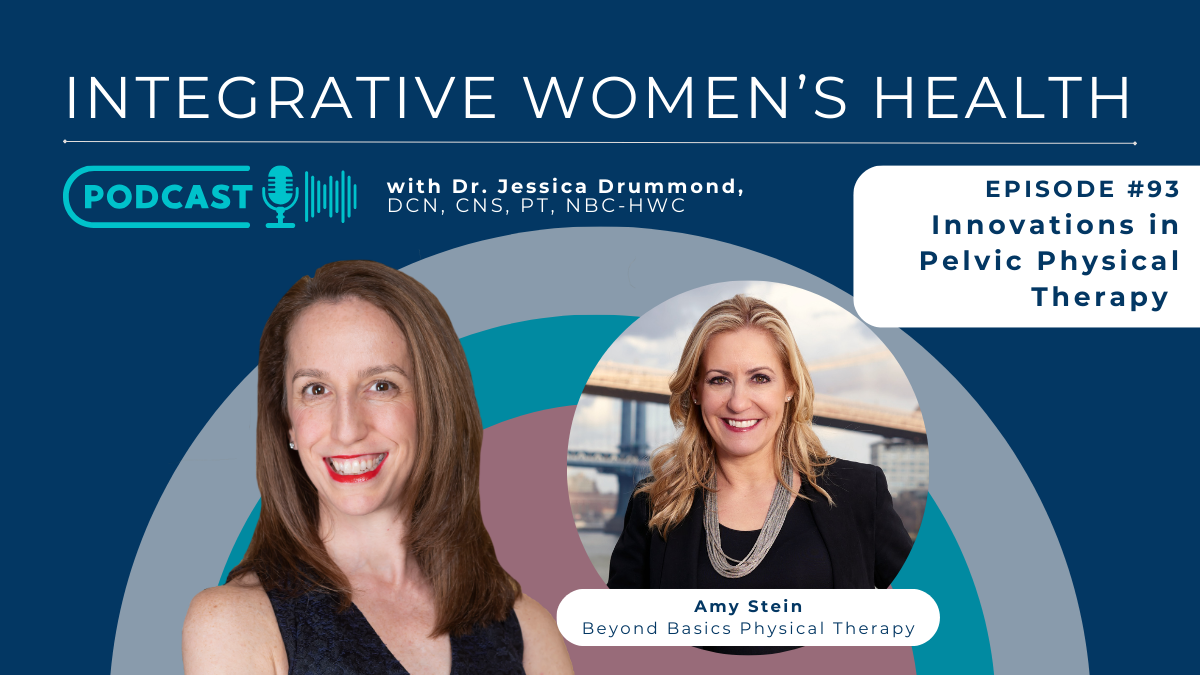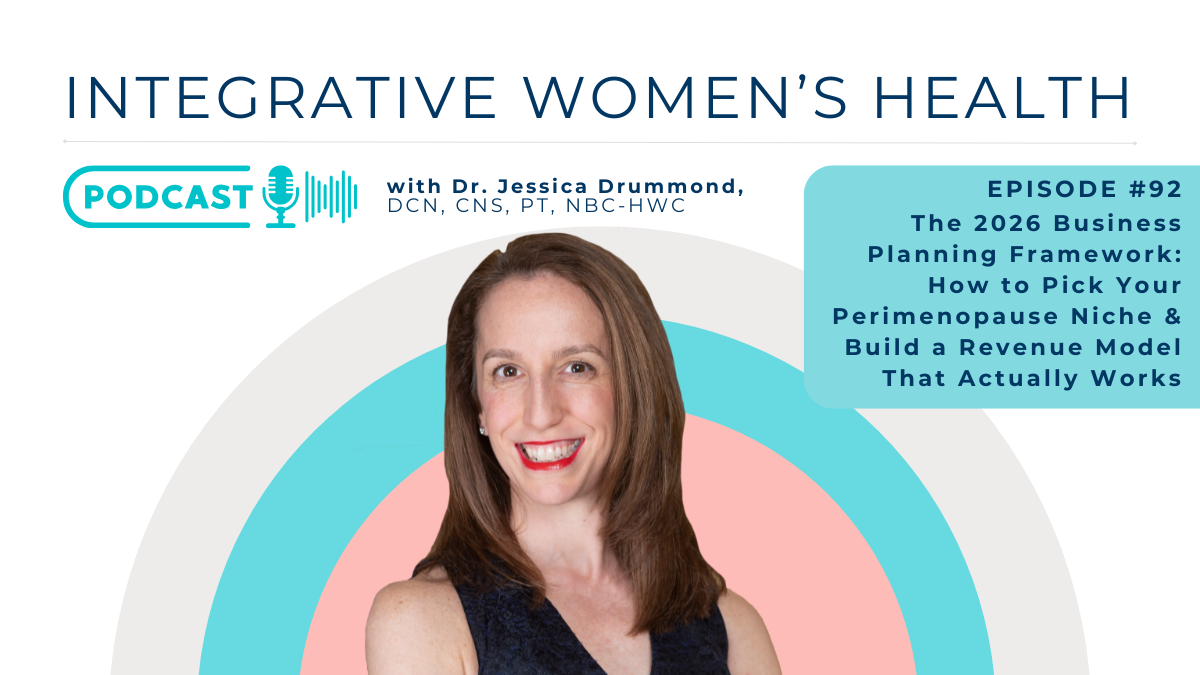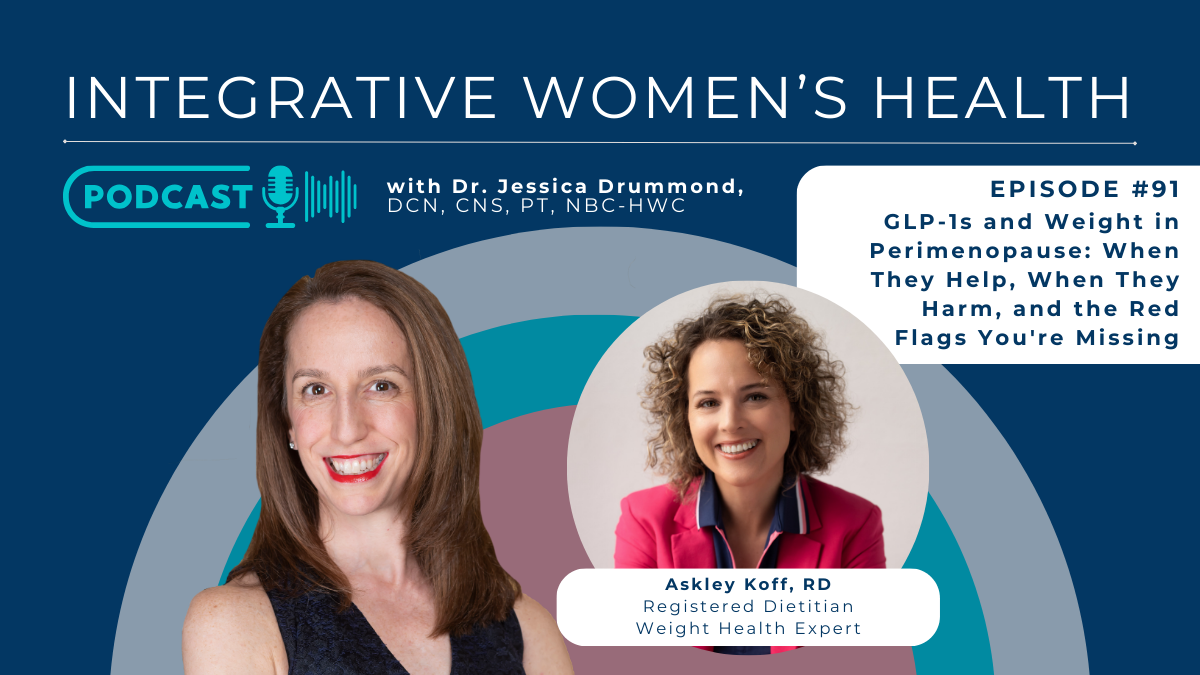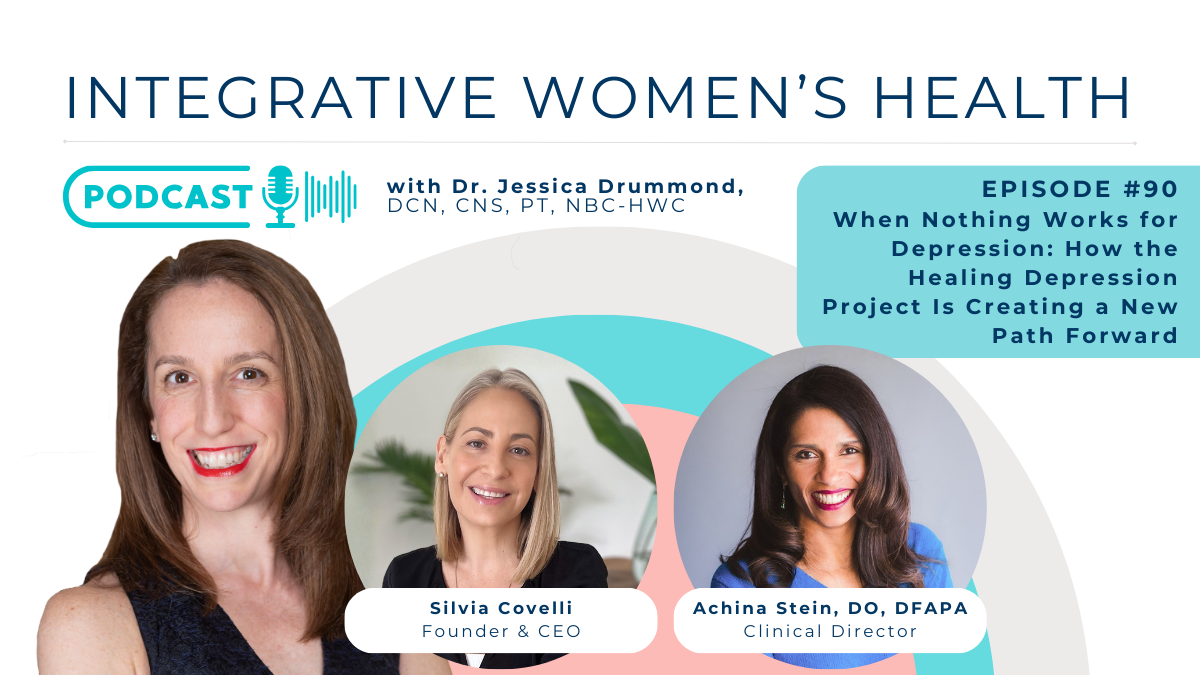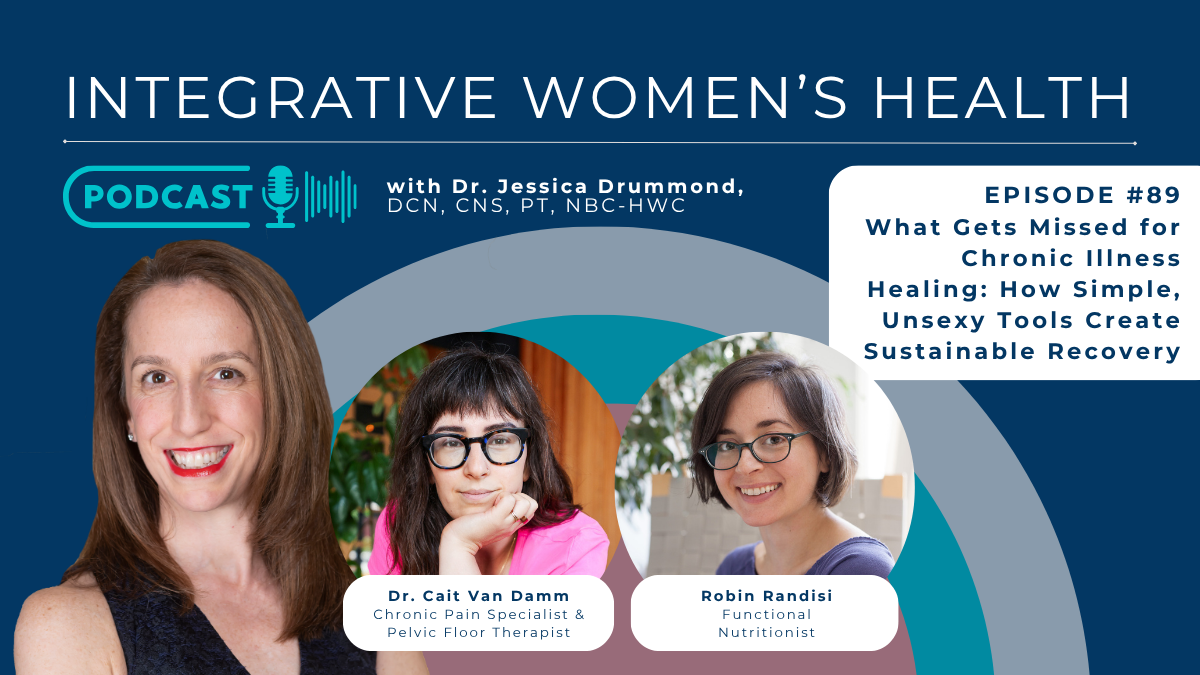Follow Us for Free:
About the episode
“I have a bigger connection with my patients than I ever have, and that even translates to working with other professionals on the care team.” – Dr. Maggie Roth, PT, DPT, ATC, WHC
Integrating health coaching into our existing practices and skills can profoundly improve patient care and outcomes. In clinical training, we’re typically taught to measure success against a set of functional goals. It’s rare for clinicians to encourage patients to think about goals specific to their lives and support them in achieving them.
The healing journey is not just about evidence-based measures like how far a patient can walk and what their endurance is. Those metrics are important, but they’re not the whole story and don’t reflect a holistic approach to women’s health.
Today, I’m thrilled to introduce you to Dr. Maggie Roth, a graduate of our Women’s Health Coach certification program. Maggie is a pelvic health expert and physical therapist who now specializes in working primarily with mothers who also deal with chronic pain. Since graduating, she has integrated her coaching training into her physical therapy practice in a way that has helped her clients get to a point of being fully well and in alignment with their goals.
In this conversation, Maggie and I discuss her journey into physical therapy, what it has been like integrating health coaching into her physical therapy practice, what holistic, client-centered care looks like, why relieving physical symptoms doesn’t address the whole picture, her experiences as a postpartum mother and working with women suffering from chronic pain, the need for continuing education and community support among healthcare professionals, and more.
Enjoy the episode, and let’s innovate and integrate together!
About Dr. Maggie Roth
Dr. Maggie Roth earned her studies at Marquette University, where she received her Bachelor of Science in Athletic Training and followed up with her Doctorate in Physical Therapy, which she completed in 2012. She began her career treating elite-level athletes throughout her studies at Marquette University. She transitioned to outpatient physical therapy clinics when she returned to Illinois. She treated complex post-operative conditions while working in an orthopedic physician-owned clinic. Over the course of her career, she has prioritized developing her manual therapy skills by adding dry needling, visceral and spinal manipulations, and cupping to improve the effectiveness of each treatment. After her life-transition birthing her two children, she gained interest and advanced education in pelvic health physical therapy. She has since received her credentials as a Pregnancy and Postpartum Certified Exercise Specialist. Maggie strives to continuously improve her physical therapy practices to best achieve patients’ goals.
Highlights
- Maggie’s background in athletic training and physical therapy
- Transitioning to supporting women with their pelvic health
- Why Maggie chose the Women’s Health Coach Certification Program
- The unique aspects of this progra and its emphasis on integration and communication
- The value of hands-on practice during the program, helping with real-world application
- How health coaching has deepened Maggie’s connections with patients and improved their care experiences
- The impact of coaching training on Maggie’s personal life
- Maggie’s journey toward achieving work-life balance
- How Maggie plans to integrate health coaching into her physical therapy practice, focusing on mothers
- The synergy between physical therapy skills and experience and health coaching for better patient outcomes
- Taking a client-centered approach and moving beyond traditional outcome measures
- Maggie’s advice for aspiring health coaches
- The value of ongoing learning and curiosity to enhance patient care
- Why community collaboration is crucial for addressing complex chronic pain and illness
- Professional support networks for clinicians and coaches
- Supporting clients to achieve personal goals rather than solely focusing on standard metrics
Connect with Dr. Maggie Roth
- Call or Text Dr. Maggie Roth at 630-296-7221
- Dr. Maggie Roth’s Podcast | Making It With Maggie
- Dr. Maggie Roth on Instagram @RibbonPTWellness
Ready to revolutionize your career and grow your practice?
- What is the next step in your career in women’s health and wellness? Start here: https://integrativewomenshealthinstitute.com/start-here/
- Integrative Women’s Health Institute on Instagram | @integrativewomenshealth
- Integrative Women’s Health Institute on YouTube
Learn more about The Integrative Women’s Health Institute’s Programs.
Click here for a full transcript of the episode.
Dr. Jessica Drummond 00:00:03 Hi and welcome to the Integrative Women’s Health Podcast. I’m your host, Doctor Jessica Drummond, and I am so thrilled to have you here as we dive into today’s episode. As always, innovating and integrating in the world of women’s health. And just as a reminder, the content in this podcast episode is no substitute for medical advice, diagnosis, or treatment from your medical or licensed health care team. While myself and many of my guests are licensed healthcare professionals, we are not your licensed healthcare professionals, so you want to get advice on your unique circumstances. Diagnostic recommendations treatment recommendations from your home medical team. Enjoy the episode. Let’s innovate and integrate together. Hi there. Welcome back to the Integrative Women’s Health Podcast. I’m your host, doctor Jessica Drummond, founder and CEO of the Integrative Women’s Health Institute. I am thrilled to introduce you today to Doctor Maggie Roth. She is a pelvic health specialist, physical therapist, and graduate of the Women’s Health Coach Certification, and she comes to this work as a pelvic health expert, physical therapist, and living her own experience as opposed to a mom who had tons of experience working with athletes and athletic injuries.
Dr. Jessica Drummond 00:01:40 And now she specializes in working with women, especially mothers, mothers of young children who also deal with chronic pain. If you are a new mom, a mom of elementary school kids, if you’re a women’s or pelvic health physical therapist who is considering integrating health coaching not only to help your health, but to help your relationship with your partner and your children, and to really improve your work life balance so that you can take care of your own health. This episode is for you, so let’s get into it and meet Doctor Maggie Roth. Hi and welcome back, everyone to the Integrative Women’s Health Podcast. I’m so excited to introduce you to Maggie Roth. She is one of our Women’s Health Coach Certification graduates. She comes to us as a physical therapist with a subspecialty in pelvic health, and we are going to get into this conversation about her transformation in work and life. I think it’s so exciting to hear other people’s stories of their career progression when we’re thinking about what we might want to do with AR. So welcome, Maggie.
Dr. Jessica Drummond 00:03:08 Tell us a bit about your background before you began the Women’s Health Coach Certification.
Dr. Maggie Roth 00:03:13 So I originally went to school for undergraduate for athletic training and continued my studies in physical therapy. And at the time, I was gung ho on ortho had done a ton of sports seeing all the injuries experience some myself. And it’s just funny because you were introduced to these different specialties and very narrow minded going into it and didn’t really know what more there was out there. So when I graduated, I had done the hey, you’re seeing everybody every half hour. You’re doing ortho, you’re working with athletes, elite athletes, high school athletes and everybody in between got more into complex post-operative conditions, which is where I started to see some of the cracks in the system where, hey, we’ve got people that are getting lumbar fusions or back surgeries, and it’s not addressing their pain. They still have the same pain. And that clicked for me, what are we missing? And we could get them 70% better, 80% better. But it’s not where they wanted to be or where they expected to be after undergoing such a complex journey for them to.
Dr. Maggie Roth 00:04:40 And it’s frustrating to see people leave and they’re not achieving their goals. That’s ultimately why you get into this, is to be a guide to help people achieve their goals. After having kids myself and going through a difficult postpartum journey and realizing that there weren’t enough resources or I was questionable with the resources I had. I delved into pelvic health and really supporting women and people with a female pelvis to really hone in on what more can we do? And that started with pelvic PT slightly before the pandemic, and during that time, I had an opportunity to just reassess where I wanted to be. What was I not answering at the time, and how could I get more information as a type of person? You come out of school thinking you’ve got a lot of the answers, and it’s been a very humbling journey to realize that, and there’s so much more to learn out there. So it was a couple of years in the making that I was delving into. I liked the, the health coaching end of things and just figuring out what program worked for me.
Dr. Maggie Roth 00:05:56 I had interviewed a couple different areas. I had reached out to a few different people within the field. Shall Lions. I looked at your website and then I had interviewed through that process, and it took a little bit of committing, and it was really more of the financial limitation at the time. And finally, I’m like, you know what? I’m going to start my own practice. What can I do more for people? And how can I give this a more holistic, integrative approach to this? And as I started my own practice, I’m like, you know what? It’s just time to commit. I, I’m going in a different direction within my life, and I feel like I can help people a little bit better. And that’s when I started the women’s health coaching program.
Dr. Jessica Drummond 00:06:43 Yeah. What were some of the features that stood out to you about this program above and beyond others.
Dr. Maggie Roth 00:06:53 I mean, that’s your whole approach and the ethos behind it is the integration. It’s not just focusing on functional medicine or the nutrition aspect.
Dr. Maggie Roth 00:07:04 It’s not just the physical aspect. We are taking multiple components of an individual and really the communication behind it and recognizing how I can take myself out of it a little bit more and make it more about someone else’s journey and being able to separate those two while being a coach or being a guide during this, to the amount of time that we had to practice in person. The retreats are extremely beneficial and for people out there that haven’t taken it, there are three day courses three times that you are devoting your and dedicating your time to to be able to work on this with different individuals and see different aspects and get different feedback, so that you can truly better yourself to be able to help others more to achieve their goals.
Dr. Jessica Drummond 00:08:06 Yeah. So within our program, we actually have that hands on. And with everyone else in your program that practice, practice, practice, that’s what we hear all the time too. It’s like you can learn and intellectually understand coaching, but it’s a totally different thing to practice, practice, practice.
Dr. Maggie Roth 00:08:28 Absolutely. And I the modules are extremely helpful and we are guided throughout the program. Hey, before this first retreat you may want to complete these modules. So that way you’re prepared in the best way possible to help yourself and others that are in the retreat and give the appropriate feedback and receive the appropriate feedback so that everybody’s benefiting. And I, I always find it funny, you know, within within any field that we’re practicing in, just being able to participate and get that repetition is where you’re going to stand apart from others and honestly make it more comfortable for when you actually practice this. Clients can feel that ultimately you want to create that safe space for them, if anything. And yourself. And if that’s what I’ve learned the most from that, is it?
Dr. Jessica Drummond 00:09:25 Yeah. I think that’s so powerful because one of the biggest complaints about the conventional health system, but even the sort of like integrative health system is that there’s a lot of gaslighting and lack of safety. And even just like here, put this gown on and sit naked in a room for an undetermined amount of time, like no matter what.
Dr. Jessica Drummond 00:09:51 It’s a very uncomfortable environment for people. Talk a little bit about how integrating health coaching within your physical therapy practice has made you feel less burnt out.
Dr. Maggie Roth 00:10:06 Absolutely. I have a bigger connection with my patients than I ever have, and that even translates to working with other professionals within. I don’t even want to limit it to the Western medicine paradigm, because it’s just with any professionals that are working with the care team, that these individuals have chosen to assist them through their journey too. I had a client not too long ago that she was having trouble with intimacy, being able to experience it without fear, and we were able to peel away. I always describe it as like you’re peeling away the layers of an onion, and you’re really trying to get at the root cause. And I’m able to have 45 minutes with my patients one on one, which is fabulous. And it took an entire 45 minutes to get down to. A few years ago, she had moved a room to make room for a desk, and it was just the matter of changing where her bed was facing to make her feel more comfortable.
Dr. Maggie Roth 00:11:11 Other practitioners or professionals don’t have that kind of time. It took the 45 minutes, and if you are just going through getting bombarded with questions and not giving space for people to be able to really dig deep and ask those curious questions or answer them, we would have never figured that out. And it made such a huge jump to where she was and where we were able to go, and then just feel comfortable enough to discuss some of those smaller details was able to jump start. I felt like her healing journey.
Dr. Jessica Drummond 00:11:50 Yeah, and it’s not even just the time. It’s the skill of listening. It’s the skill of knowing what little pieces to pick out in the story. And those are really the communication tools of coaching. So now as you’re building your coaching practice, have you seen anything about how this will affect your own life, your clients, your ability to be more flexible with your family and friends?
Dr. Maggie Roth 00:12:29 It’s been such a rewarding experience going through this certification program and practicing because it’s something that is incorporated into every facet of my life.
Dr. Maggie Roth 00:12:43 It’s how I communicate with my family, my friends, my clients. And when we’re defining communication, I feel like we kind of have the narrow mindedness of it’s the talking piece of it. But what we tend to ignore is the listening piece, and being able to give that space and realizing that people just have time to dig into their thoughts. And I grew up in a family that there were so many of us who just talk over each other. And when you’re limited with a certain amount of time, even in the clinic, you’re like, okay, we’ve got to speed this up because I’ve got more questions to ask when really, in the grand scheme of things, okay, if we can get through this, there’s always time to approach it at a later date to at least for where I’m at professionally. But communicating with my kids. I have a seven and five year old and Sometimes they’re having a hard time expressing themselves. You know, they’re emotionally trying to regulate and they don’t understand the right words and just being able to give them space.
Dr. Maggie Roth 00:13:53 My husband, my partner, when when you’re having a discussion and being able to stay curious, stay open. And I’m constantly reassessing where I’m at. Usually every couple of weeks and we’ve practiced this, it’s one of the first things we learn in the course is assessing yourself and knowing where you’re at. So that way you can be able to help others and kind of almost dissociate, you know, okay, where am I at? Am I muddling the waters for others too? And okay, this has been better. My perspective has been better this week, but now I really want to work on the physical aspect. Now that I’ve worked on that, after I’ve reassessed that after a few weeks too. So yes.
Dr. Jessica Drummond 00:14:41 Yeah. So it really touches every aspect of your life. And one of the things we do, do, as you said on the very beginning of the program, is kind of turn the mirror. Any improvements on physical health, anything like that.
Dr. Maggie Roth 00:14:56 At the beginning of the program? I struggled with work life balance, and even before that, one of my toughest transitions was after I had my daughter.
Dr. Maggie Roth 00:15:06 So she’s I’ve got two kids, and that balance really turned me for a loop. And then I am very dedicated to my career also. But being able to recognize where I want to put my energy, you know, I was like, go, go, go all the time, never had enough rest. And that’s where the burnout happens just in life. So being able to take a step back and you know, what’s what’s going to energize me at this moment is it’s sitting back and reading a book. Is it hopping on the bike? Is it? We just spent two weeks and we were outside the entire time, and I’ve never felt more rejuvenated. And it was a balance of family time, time to myself and really communicating that with everybody else around me. Hey, I just need a moment, you know? Hey, I’ve got to get laundry done today, and then we can hang out and we can do a bonfire or something like that. Hey, mom’s got to do a little bit of work tonight before we go to bed, but then we’re going to read some bedtime stories and just being open about setting boundaries, letting people know my boundaries, but respecting other peoples also, again, family, friends, clients.
Dr. Maggie Roth 00:16:27 That’s where I’ve really seen the most success.
Dr. Jessica Drummond 00:16:33 That’s lovely. And so as you envision now, you’re just in the beginning stages of starting your health coaching practice. What’s your vision for the next? And I know you’re already doing it at some level, but what’s the bigger vision?
Dr. Maggie Roth 00:16:51 I would love to incorporate the coaching within physical therapy and not necessarily as the same entity, but as an adjunct to it. So being able to have two days a week where I am working with coaching clients to be able to help them along their journey, and specifically. Right now my practice is moving towards mothers, but mothers managing chronic pain. It integrates both worlds of where I’ve come in my career and really niching that to not just all moms, and I’m willing to help anybody that wants that assistance. But recognizing how much chronic pain has affected people, or chronic conditions for that matter, that are really functionally limiting and just being there as a support system. So that way people aren’t alone and they know that they have it within themselves to get over these humps, to be able to get whatever goals they’re looking to strive for.
Dr. Jessica Drummond 00:18:06 Yeah, that’s so beautiful, because I think there’s such an integration between your skill set of physical therapy, your experience. But now you’ve seen as a busy working mom, as you’ve started to integrate functional nutrition, as you’ve started to integrate health coaching, communication skills, lifestyle medicine skills, that instead of kind of having people being stuck at that 80% recovery level, some of them are getting all the way there.
Dr. Maggie Roth 00:18:36 It’s fascinating because again, when we’re reassessing with our clients, whether it’s coaching, whether it’s physical therapy or whatever, whatever entity you’re in, we’re always thinking, is this enough? Is what I’m doing is is what this patient’s doing enough? Are we providing enough resources, other, other resources that can be part of the care team that we’re overlooking? And I think with what we’ve learned in the health coaching realm is there’s endless opportunity to draw more help into it, to be able to meet whatever goal that is. And taking myself out of it is, oh, they’ve mentioned these types of goals that they want to get at, but when we reassess or we dig deeper, making sure that they understand their goals also and really honing it down to, okay, are all these kind of ancillary as what the root cause is to be able to get at what they ultimately want to achieve.
Dr. Jessica Drummond 00:19:43 Yeah, I think that’s so important because a lot of times, while we set goals in any clinical circumstance, having that real connection, understanding and the ability to really measure, like did you achieve your goal and are you aware of it? Like, can you say I achieved that goal is something that I think at least in my clinical training and experience, when I was only practicing physical therapy, it’s like we hit certain functional goals. But it wasn’t always exactly what the client had in mind, like walking in a certain number of steps, having this amount of energy where they’re they’re around something like what you said before, like Having this presence of mind, I need to step away, even if my children are kind of needy in the moment. Now I have the tools to actually execute what I mean by having enough energy, having enough endurance. It actually means having enough self care that I can be present with my kids, but also set boundaries with and for my kids.
Dr. Maggie Roth 00:21:02 I think when we go through PT school, you’re set with all these outcome measure tools.
Dr. Maggie Roth 00:21:07 If we hit this certain number, you know, there’s a clinical difference and it’s so set in stone. And yes, there’s research based behind it. But what people don’t recognize is it’s not the all that ends all either. It is another tool in the toolbox. And so sometimes I’ve had people where they don’t necessarily achieve these numbers, but they feel so much better around themselves or when people fill those out. I’ve had so many times where that like that doesn’t always apply to me, and it’s a great starting point. What we don’t recognize is that it’s a screening tool, but you’re not asking the curious questions or the deeper questions to get at what those clients are actually in there for, and sometimes they don’t even know what they’re in there for. I can’t tell you how many times that you’re sent. And they’re like, I was told to come here. You’re like, okay, well, water, what are your goals? Let’s actually get at a reason you want to be here or why you you went to doc and why they’re sending you here and see if this is the appropriate space for you.
Dr. Maggie Roth 00:22:15 And if not, then let’s get you someplace that you feel comfortable being to where you feel like you can succeed.
Dr. Jessica Drummond 00:22:24 Yeah, very, very client centered, which I think is different than what we learn in a truly patriarchal health care system, even if it’s more ingrained patriarchy, like it’s just the structure of the system. It’s not necessarily male versus female, it’s just this. The doctor is going to tell you what you’re going to do versus a really client centered model that truly client centered, where they get a lot of say in what they’re trying to achieve. So if you were to be talking to a person, listening to this episode who’s considering becoming a certified women’s health coach, what would be your suggestions for them? Your thoughts?
Dr. Maggie Roth 00:23:08 Simple. As Nike put it. Just do it. If there’s any hesitation whatsoever. I think for a lot of us that go in and we are just so tunnel visioned with the Western paradigm, and even with any training, it just opens a multitude of keeping you motivated and really shifting to where you can see more progress in your clients, in your patients.
Dr. Maggie Roth 00:23:42 If you’re feeling stuck. There’s always something more to ask. And I think it’s lovely because we have such a community to around this. You know, you have the support group of alumni that have gone through the program that we communicate on a regular basis, or if you have questions and there’s so much support within this community too, I want to give a heads up to my accountability partner that would practice with me just outside the retreats. You’re constantly practicing and getting feedback, and Stephanie was wonderful during the year and a half, and even afterwards, we would continue to practice or discuss different scenarios that we would run into. If you feel like you’ve achieved it all, you’re not going to get any better. There’s always room for improvement, and these give you the tools to continue improving and the resources you continue to provide to the community. Jessica has been just fascinating. I’m updating myself daily. If I have a lunch break, you’re always reading through something new and it just creates more questions and just continues that curiosity, which is where we need to be to make our clients better for themselves.
Dr. Jessica Drummond 00:25:08 Yeah. And I think you are working with patients with complex chronic pain, complex chronic illness, and the world is evolving. This is getting more and more challenging to unravel. So we really need to collaborate as a community and get those updated research tools continuously.
Dr. Maggie Roth 00:25:28 Absolutely. And it’s you know, we’ve all lived through this pandemic at this point. And I know a lot of your focus recently has been on long haul Covid effects, and it’s only going to continue to present over the next few years. And we just want to make sure that we focus so much on the physical aspect of what’s happening with the individuals that have experienced this, but how can we take a more holistic approach to help them manage this? What support system do they have or what they still need not should have? You know, like as we’ve discussed, let’s take the shoulds out of this scenario. What do you need to be able to succeed?
Dr. Jessica Drummond 00:26:16 Yeah, and I love that you highlight our community because as professionals and coaches and clinicians, we need that support too.
Dr. Jessica Drummond 00:26:24 So I’ve been so grateful to have our alumni stay so actively engaged, for many of them, for more than a decade.
Dr. Maggie Roth 00:26:33 It’s fascinating, and it’s just a group of I don’t want to limit it to like minded people because again, that puts you in a box. There’s so much that people can attribute to just thinking outside of that box, but it’s a group of individuals that are motivated to see change and make a difference and really get at the resources that others need that we just may not think about on a regular basis.
Dr. Jessica Drummond 00:27:04 Yeah for sure. So if anyone is interested in learning more about your practice or connecting with you, where should they reach out?
Dr. Maggie Roth 00:27:15 So the best way to reach me is calling or texting and that number will be in the show notes. I have been posting on social media at Ribbon Tea Wellness with my boundaries over the summer. I’ve kind of taken a break from that a little bit and spent some time with family. But coming up here as the kiddos go back to school that will be more updated.
Dr. Maggie Roth 00:27:41 I have a podcast myself. It’s called Making It with Maggie, where I discuss a lot of these topics in relation to women taking accountability and just recognizing the power they have within themselves. It’s transitioning or transforming from awareness to aware. Yes, and being able to have that power and recognizing you have that control within yourself with a positive spin on it. So that way you can achieve your goals. Where we go over case studies and we go over some of the difficult topics that we’re just seeing on a daily basis, and it doesn’t just have to apply to one area in your life, it can apply to multiple areas in your life too.
Dr. Jessica Drummond 00:28:26 I love that, so thank you so much for being here, Maggie, and thank you so much for your positive contributions to our entire IUI community.
Dr. Maggie Roth 00:28:38 Thank you for having me, I appreciate it.
Dr. Jessica Drummond 00:28:41 Thanks. Oh my gosh, I loved my conversation with Doctor Maggie Roth, pelvic health physical therapist and women’s health coach extraordinaire. She really able to help her clients go from that kind of 75%, 80% better to be fully well, most importantly in alignment with their goals.
Dr. Jessica Drummond 00:29:10 And I love how she also took from the program this connection with our community, and then utilize that to reassess her own goals, her own work life boundaries, improving her own work life balance, improving her own boundaries even around her work and her social media marketing. She loves still being engaged with the community. We love seeing her grow over time. It’s changed. Her parenting and clients are in such skillful and humble hands now. Not that they weren’t before, but you can see the growth in Maggie and how she now takes this fully integrated approach. She’s thinking about her clients not just in terms of their physical symptoms and challenges, but in terms of how they can live fully. And while we think about functional goals in our clinical training, it’s very rare that a person comes into a safe space and then is supported to think specifically about the goals that apply to their lives, not just the evidence based outcome measures that they can check off, how far they can walk and what their endurance is and what their age level is, or any of those like metrics.
Dr. Jessica Drummond 00:30:32 The metrics are important, but they’re not the whole story. And I really see that shining through. And what Maggie took away from this week women’s health certification experience. It’s an experience that she’s been able to apply to her life and to her clients, and really helping them come up with goals that are aligned with what they care about, not what the checklist cares about. Not that that’s unimportant, but it’s not the whole story. So if you’re on the fence deciding whether or not becoming a certified women’s health coach is for you, get in touch with one of our career counselors, one of our career coaches. They will help you navigate whether or not women’s health coaching is the right next step for you, what your actual goals are, and help you find the best next steps to be in alignment with those goals. This is exactly what we do. All right, I’ll see you next week on the Integrative Women’s Health podcast. Have a great week. Thank you so much for joining me today for this episode of the Integrative Women’s Health Podcast.
Dr. Jessica Drummond 00:31:53 Please share this episode with a colleague. And if you loved it, hit that subscribe or follow button on your favorite podcast streaming service so that we can do even more to make this podcast better for you and your clients. Let’s innovate and integrate in the world of women’s health.
Join Dr. Jessica Drummond to learn the three key steps to becoming a successful, board-certified Women’s Health Coach who leaves a lasting positive impact on their clients.
Learn how utilizing health coaching skills in your practice is crucial to your success, leaving a lasting impact on your clients, and shifting the paradigm of women’s healthcare.

Dr. Jessica Drummond
Founder & CEO
The Integrative Women’s Health Institute
At the Integrative Women’s Health Institute, we’ve dedicated 17 years to crafting evidence-driven, cutting-edge programs that empower practitioners like you to address the complexities of women’s health.
Dr. Jessica Drummond’s unique approach focuses on functional nutrition, lifestyle medicine, movement therapies, nervous system dysregulation, trauma, and mindset – essential elements often overlooked in traditional health education.
In addition, your training will be fully evidence based, personalized, and nuanced (this is not a cookie cutter approach) in functional nutrition, exercise, recovery, cellular health, and all other lifestyle medicine tools.
You’ll learn to support your clients with cutting edge tools safely and effectively.

